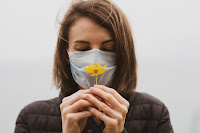198th day in the UoA
198th day in the UoA/会津大198日
会津大学学生の皆さんへ
夏休みの間はお休みしていたメルマガですが、今日から再開します!1か月休んでいる間に、今年度が始まってから198日目となり、200日が目前になっているんですね。混乱していた4月に比べると大学は落ち着きを取り戻し、公私ともに落ち着いた学生さんも多いのではないでしょうか。後期はあっという間に寒くなり、雪の季節となりますが、それも会津の良さです!
★カウンセラーより★
みなさんこんにちは、9月から相談室に復帰した吉澤小百合です。
 後期が始まって1週間経ちましたね。いかがお過ごしですか?朝晩の冷えを感じる季節になり、こたつの準備を始めた方もいらっしゃるでしょうか。会津大卒業生の私は、毎年この時期になると、学園祭のためにおでんを煮た寒い朝を思い出します。今年は学園祭もLIVE配信となり「これも一つの”新しい生活様式”だなぁ」としみじみと実感した週末でした。
後期が始まって1週間経ちましたね。いかがお過ごしですか?朝晩の冷えを感じる季節になり、こたつの準備を始めた方もいらっしゃるでしょうか。会津大卒業生の私は、毎年この時期になると、学園祭のためにおでんを煮た寒い朝を思い出します。今年は学園祭もLIVE配信となり「これも一つの”新しい生活様式”だなぁ」としみじみと実感した週末でした。
新しい生き方と古い生き方が切り替わる時、人は必ずストレスを感じます。そのストレスを上手に乗り越え、新しい生き方に馴染んでいくためには、新旧のメリット・デメリットをバランスよく見ていくことが必要です。過去を美化しやすい人間の特性を加味すると、古い生き方はデメリット多めに、新しい生き方はメリット多めに目を向ける方がちょうどいいくらいです。
「周りはもう新しい生き方に適応していて、自分だけ取り残されたように感じる」と思ったら、新古それぞれのメリット・デメリットを見直してみてくださいね。
★看護師より★
今回はビタミンDについて免疫とのかかわりと食事摂取基準量をご紹介します。
食事や日光浴で得たビタミンDは体内で活性化ビタミンD に変わります。この活性化ビタミンDはマクロファージと結合して抗ウイルス作用を発揮します。また、B細胞を活性化し免疫ブロブリン合成を促したり、制御性T細胞(キラーT細胞の暴走を防ぎ免疫異常を起こさない働きをする)の生成を促し免疫機能を調整します。
2020年度日本人の食事摂取基準によるとビタミンD目安量は18才以上で8.5μg/日以上【上限 100μg/】で、さらに次のような記載があります。「ビタミンDの基準値は、日照により皮膚でビタミンDが産生されることを踏まえ、フレイル予防を図る者はもとより、全年齢区分を通じて、日常生活において可能な範囲内での適度な日光浴を心がけるとともに、ビタミンDの摂取については、日照時間を考慮に入れることが重要である。」
秋から冬は日照時間が短く、紫外線の量も夏に比べて少なくなります。そのため、必要とするビタミンDを得るのに、秋から冬は積極的に屋外活動することをお勧めします。
<参考値>
2018年度の日本国民健康・栄養調査によるビタミンD食事摂取量の平均値
15才から19才は5.6μg/日、20才から29才は5.3μg/日、30才から39才は5.7μg/日
+-+-+-+-+
相談窓口
+-+-+-+-+
◎保健室
nurse@-aizu.ac.jp
電話番号:0242-37-2517
平日 午前9時-午後4時
◎学生相談室
counseling@u-aizu.ac.jp
0242-37-2610
月火水金:9:00-16:00 木:14:00-16:00
※週4日の開室です。
◎学生課教務係
sad-ass@u-aizu.ac.jp
0242-37-2600
平日:9時ー17時
■━━━━━━━━━━━━━━━━━□
過去のメルマガはこちら!
http://support-u-aizu.blogspot.com
□━━━━━━━━━━━━━━━━━■
◇~◇~◇~◇~◇~◇~◇~◇~◇~◇~◇~◇~◇~◇~◇~◇~◇
Dear students of the University of Aizu,
We will restart the newsletter today after a one-month break! While we were off during summer recess, it has become the 198th day since this academic year started, and the 200th day is just around the corner. Compared to the upside down situation in April, the university has recovered the normal state, and I believe many of you are feeling more peaceful both academically and privately. In the second semester, it will quickly become cold, and we will have snow soon, which is one of the good things in the Aizu region!
★ From the Counselor ★
Hello, everyone! My name is Sayuri Yoshizawa, who returned to the UoA as a counselor last month.
 It’s been a week since the second semester started. How are you doing now? I wonder if some of you have prepared a kotatsu because it is rather cold in the morning and evening. I graduated from the UoA, and at this time of the year, I remember the cold morning when I cooked oden for the school festival. This year, the school festival was broadcasted online, which made me realize that this was one example of the “new normal”.
It’s been a week since the second semester started. How are you doing now? I wonder if some of you have prepared a kotatsu because it is rather cold in the morning and evening. I graduated from the UoA, and at this time of the year, I remember the cold morning when I cooked oden for the school festival. This year, the school festival was broadcasted online, which made me realize that this was one example of the “new normal”.
When we experience a change from an old way of life to a new one, we all experience stress. In order to overcome the stress and get used to a new lifestyle, we need to see the balance of merits and demerits of the old and the new. Considering that humans have a tendency to overestimate the past, it is just about right to pay a little more attention to the demerits of the past and the merits of the new.
If you feel like everyone but you has adjusted to the new normal, please reevaluate the merits and demerits of the past and the present.
★ From the nurse ★
Today, I would like to inform you about the relationship between vitamin D and immunity as well as the dietary intake standard of vitamin D.
You take vitamin D from food and by exposing yourself to the sun. Vitamin D is activated in your body, and it binds with macrophages, producing antiviral effect. Also, it facilitates the synthesis of immunoglobulin and the production of regulatory T-cells (which prevent immune abnormality by stopping overfunction of killer T-cells), resulting in appropriate immune system control.
According to the dietary intake standard for Japanese in 2020, adults over 18 years old should take at least 8.5μg of vitamin D per day (up to 100μg). It also says, “In order to take the standard amount of vitamin D, it is important for the people of all ages, including those trying to prevent frailty, to expose yourself to the sun as much as possible in your daily life because vitamin D is produced in the skin following the exposure to the sunlight. You also need to take the hours of daylight into consideration for the intake of vitamin D.”
In the autumn and winter, the sunshine duration is shorter, and the amount of ultra violet rays is much less than in the summer. Therefore, I recommend you to have more outdoor activities in the autumn and winter to take the necessary amount of vitamin D.
[Reference]
Average dietary intake of vitamin D reported in the National Health and Nutrition Survey in 2018
from 15 to 19 years old: 5.6μg per day
from 20 to 29 years old: 5.3μg per day
from 30 to 39 years old: 5.7μg per day
+-+-+-+-+-+-+-+-+-+-+-+
Consultation services
+-+-+-+-+-+-+-+-+-+-+-+
◎ Nurse’s room
Email: nurse@-aizu.ac.jp
Tel:0242-37-2517
Weekdays from 9 am to 4 pm
◎ Counseling Room
Email: counseling@u-aizu.ac.jp
TEL: 0242-37-2610
Mon, Tue, Wed and Fri: 9:00-16:00 Thur:14:00-16:00
※Open four days a week
◎ Student Affairs
Email: sad-ass@u-aizu.ac.jp
TEL: 0242-37-2600
Weekdays from 9 am to 5 pm
■━━━━━━━━━━━━━━━━━━━━□
This mail magazine has been archived here!
http://support-u-aizu.blogspot.com
□━━━━━━━━━━━━━━━━━━━━■



コメント
コメントを投稿